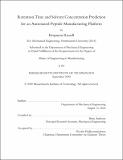| dc.contributor.advisor | Brian Anthony. | |
| dc.contributor.author | Russell, Benjamin
(Benjamin David) | en_US |
| dc.contributor.other | Massachusetts Institute of Technology. Department of Mechanical Engineering. | en_US |
| dc.date.accessioned | 2021-10-06T19:57:32Z | |
| dc.date.available | 2021-10-06T19:57:32Z | |
| dc.date.copyright | 2020 | en_US |
| dc.date.issued | 2020 | en_US |
| dc.identifier.uri | https://hdl.handle.net/1721.1/132759 | |
| dc.description | Thesis: M. Eng. in Manufacturing, Massachusetts Institute of Technology, Department of Mechanical Engineering, September, 2020 | en_US |
| dc.description | Cataloged from the official PDF of thesis. | en_US |
| dc.description | Includes bibliographical references (pages 70-71). | en_US |
| dc.description.abstract | This thesis investigates statistical and machine learning techniques for the regression-based prediction of peptide retention time and solvent concentration using amino acid physio-chemical properties and historical test data from liquid chromatography and mass spectroscopy (LC-MS) testing. This research was performed alongside the team at Mytide Therapeutics, in Boston, MA between May and August 2020. Mytide delivers high-purity custom peptides on rapid timelines enabled by their novel robotic manufacturing system. This system automates and connects the disparate processes involved in manufacturing peptides. Through prior work Mytide has built a database of peptide LC-MS testing data. These results are leveraged to make predictions of solvent concentration at the retention time for specific peptides, that is in turn used to generate methods for their purification process on a per peptide basis. These optimized methods replace a general time-intensive solvent gradient. Implementation of these models cut the operating time of their purification process by 53%, while maintaining the required resolution of UV chromatogram data. Implementation of this workflow increases the throughput of their purification machine, while also reducing solvent used by 37%. | en_US |
| dc.description.statementofresponsibility | by Benjamin Russell. | en_US |
| dc.format.extent | 71 pages | en_US |
| dc.language.iso | eng | en_US |
| dc.publisher | Massachusetts Institute of Technology | en_US |
| dc.rights | MIT theses may be protected by copyright. Please reuse MIT thesis content according to the MIT Libraries Permissions Policy, which is available through the URL provided. | en_US |
| dc.rights.uri | http://dspace.mit.edu/handle/1721.1/7582 | en_US |
| dc.subject | Mechanical Engineering. | en_US |
| dc.title | Retention time and solvent concentration prediction for an automated peptide manufacturing platform | en_US |
| dc.type | Thesis | en_US |
| dc.description.degree | M. Eng. in Manufacturing | en_US |
| dc.contributor.department | Massachusetts Institute of Technology. Department of Mechanical Engineering | en_US |
| dc.identifier.oclc | 1265300058 | en_US |
| dc.description.collection | M.Eng.inManufacturing Massachusetts Institute of Technology, Department of Mechanical Engineering | en_US |
| dspace.imported | 2021-10-06T19:57:31Z | en_US |
| mit.thesis.degree | Master | en_US |
| mit.thesis.department | MechE | en_US |
